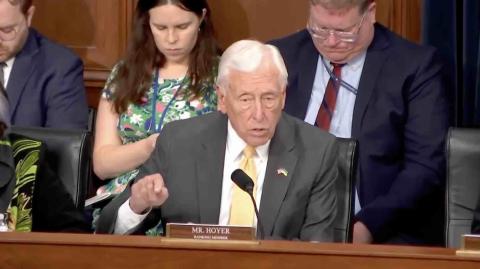Ranking Member Hoyer Opening Remarks at FSGG Hearing on IRS's Fiscal Year 2025 Budget Request
WASHINGTON, DC – Congressman Steny H. Hoyer (MD-05), Ranking Member of the Financial Services and General Government (FSGG) Subcommittee, delivered opening remarks today at FSGG's Budget Hearing on Fiscal Year 2025 Request for the Internal Revenue Service (IRS). Below is a transcript of his remarks and a link to the video:

Click here for a link to the video.
“Thank you very much, Mr. Chairman, and welcome to the chairmanship of this committee. I look forward to working with you as I look forward to and had a great relationship, as you know, with your predecessor, who is now our Ranking Member on the majority side, and I want to thank him for his leadership, and I know that you will bring the same kind of measured work to this committee's very important efforts as he did.
“I want to start by saying that, commenting on a comment you made, unfortunately the allocation historically to this committee is insufficient to meet the responsibilities of this committee, and because the objects of this committee are not necessarily of most interest either to the public or to the Members.
“However, the work of this committee, and particularly the Internal Revenue Service, is absolutely critical to all other objectives that are covered by the Appropriations Committee, and we ought to keep that in mind.
“I want to thank Commissioner Werfel for joining us on Capitol Hill today. I look forward to hearing more from you about all the IRS accomplished this year. I read your testimony. It is very impressive, the level of service and the increase that we have given to the American public, and I'm sure while they don't fully appreciate the ease with which you've made this – an experience that none of us like – much better.
“The agency made important progress in its efforts to implement the strategic operating plan that it laid out a year ago and recently updated, to enhance taxpayer services. We saw those initiatives yield impressive results in the most recent tax filing season, with the IRS fielding one million more customer service calls than it did during the ‘23 season. On average, calls only had to wait on hold for 3 minutes. I wish most of the private sector calls that I make were answered as quickly. That's a minute shorter than last year – otherwise known as 25% — and [25] minutes shorter than the 2022 filing system – the last season before we secured additional IRS funding for the Inflation Reduction Act.
“The 2024 filing season also saw the IRS make important technological advances to improve the taxpayer experience from its paperless processing initiative to its new Direct File Pilot Program. As a longtime supporter of Direct File, I was pleased to see the pilot program exceeded its target goal with more than 140,000 taxpayers across 12 states participating.
“Thanks to funding from the Inflation Reduction Act, the IRS also improved tax enforcement for high earners, successfully collecting $520 million in [legally owed] back taxes from roughly 1,000 millionaires and billionaires. These are just a few of the IRS’s achievements from the year. I'm sure Commissioner Werfel will highlight many others.
“I mention these accomplishments because they demonstrate what the IRS is capable of when it receives the resources it needs to carry out its absolutely critical work for the U.S. government, for the American people, and for our success.
“If Congress [withholds] these resources, it puts all that progress at risk. Sadly, that is exactly what many of my friends across the aisle continue to do. The antipathy directed at IRS and its employees is unfortunate, and it demonstrates an antipathy towards government.
“In the appropriations for Fiscal Year 2024, they rescinded more than $20 billion in Inflation Reduction Act funding for the agency.
“Let's be clear about what underfunding the IRS means for the American taxpayer.
“It means IRS customer service hold times will climb right back up. It means initiatives like Direct File will be delayed or put on hold. It means more high earners will be able to get out of paying the taxes that they owe under laws that are already on the books. Nobody likes to pay taxes, but all of us ought to pay the taxes that are legally owed under the laws that we pass. And Americans are particularly aggrieved when they think they are paying more than their fair share, where corporate executives are paying less than the people who work for them, in terms of percentage.
“Crucially, cutting IRS funding will add to our national debt.
“You cannot be concerned with the national debt if you're not concerned with collecting legally owed revenues to fund our critical national defense and domestic security.
“Many of my Republican colleagues claim they care about fiscal responsibility. If that's the case, then they ought to care about enforcing the law and collecting legally owed revenue. They ought to work with us to not only fulfill the Administration's request for IRS funding, but to secure additional resources to offset what was taken from the agency through the recent rescissions.
“Now, I will not be putting forward the graphs that I used during the markup, but the workload of IRS has escalated geometrically, and its resources to meet those needs have been dramatically reduced over the decades.
“I look forward to hearing from the Commissioner about why this funding is so crucial. He can illuminate all that the IRS has accomplished with these resources in the past year, as well as the consequences – the consequences – that underfunding the agency would have on the nation.
“Mr. Chairman, I thank you. I think I went a minute and 35 seconds over. I apologize for that, but I think I needed to say all that I said.”